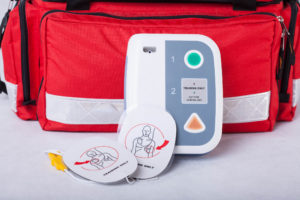AEDs: A Matter of Life and Death
It is devastating to read about the death from sudden cardiac arrest of a parishioner at Mass or a young athlete at practice, but it’s tragic to think that bystanders might have prevented such a tragedy. Regrettably, it’s true.
AEDs are specialized portable medical devices designed to recognize and treat potentially lethal heart rhythms during cardiac arrest. AEDs deliver an electrical shock (“defibrillation”) that can jump-start a heart or reestablish a normal heart rate to save the victim’s life.
Death from sudden cardiac arrest in a child or an adult can be prevented if someone does all of the following:
- Calls 911 immediately
- Starts cardiopulmonary resuscitation (CPR) promptly
- Quickly retrieves and applies an Automated External Defibrillator (AED).
AEDs are Necessary
- Early defibrillation is the most critical emergency step, because it restores the heartbeat.
- For each minute defibrillation is delayed, the chance of survival is reduced by 10%.
- There is no time to wait 8-12 minutes, an average time for first responders to arrive at the parish and locate the right building.
- Half of the young athletes who die in sports-related incidents each year succumb to sudden cardiac death. Most are male basketball and football players.
AEDs are Safe and Easy to Use
- AEDs will not deliver a charge unless it is needed.
- They are extremely user-friendly and “talk” the volunteer rescuer through process, including when to back away while the shock is delivered and when to perform CPR or administer another shock.
- Bystanders who use an AED in an emergency are covered under the state Good Samaritan law (M.G.L. C112, §12v states that bystanders have immunity from liability except for gross negligence or willful wanton misconduct)
Training and Discounts
AEDs and CPR save precious lives. Because of the importance of these life saving devices and techniques, the Office of Risk Management would like to provide CPR and AED training for some members of your staff. For more information, please contact doreen_rearden@rcab.org.
In addition, we have a list of approved vendors who sell an AED with a wall-mounting bracket and a carrying case for less than $1,200. Annual maintenance is required and costs less than $300. There are no hidden costs. Please contact us at ormlosscontrol@rcab.org for more information.


